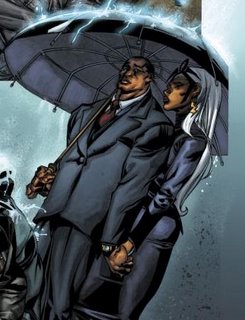Civil War has been running for what seems like a couple of years over at Marvel, and other than a
couple of
posts on
She-Hulk #8, I haven't had much to say on it.
At first, the Superhero Registration Act, the crux of
Civil War, seemed like perfect fodder for this blog. After all, it's superhero-centered legislation. But as the months went by, the need for such review seemed to pass.
For starters, I don't read much Marvel. I've bought a grand total of three CW tie-ins, two X-Factors and a She-Hulk, so I'm not in a great position to offer up an informed analysis. While I'd love to do an educational overview, I'm not about to drop a few dozen bucks just to get informed.
Additionally, there is already plenty of armchair analysis of the SRA out there. How does my saying "This is one wacked-out piece of legislation" add to the dialogue? It doesn't take a lawyer to see the absurdity in the government locking someone up until they agree to "register;" if the government has the person in custody, then they know who the person is, and the signed disclosure of one's name and powers is kinda moot. Or at least moot enough to make indefinite detention a serious exercise in overkill. (I do intend to address Iron Man's assertion on the legality of Negative Zone detention, but not in this post.)
From the beginning, I've been Pro-Registration. Or at least anti-Anti-Registration. I find the argument that there's a civil right to anonymously patrol the streets in costume and fight crime rather laughable. I thought the SRA could have used more definition in its details, but it's aim is practically a logical imperative of the law. Superheroes aren't generally immune from civil or criminal liability, and having an anonymous public persona makes it difficult to enforce the law with respect to that person.
Even certain Marvel creators have admitted that while they're anti-Reg with respect to
Civil War, they'd be absolutely in favor of some kind of registration law if we had superheroes in the real world. I suspect that's true of most people, particularly if the real-world SRA were rationally constructed.
Unfortunately, the more we learned about Marvel's SRA, the worse it got. Superhero registration became superhuman registration, which became superhuman conscription. And in an astonishingly stupid turn, the punishment for failing to comply with this
regulatory law turned out to be indefinite detention in a parallel dimension, without trial. Imagine failing to register with the Selective Service by your 18th birthday, and having the US government throw you in the Phantom Zone as a consequence. This absurdity more or less culminates in the treatment of Speedball, who gets punished (and punished rather severely) for failing to register while both unconscious
and unpowered.
All of this irked me for a while. Why couldn't the terms of the SRA have been better defined upfront? Why bring in SHIELD? And what was Millar thinking by involving the Negative Zone? Why has the SRA been presented in such a bizarre and legally absurd fashion?
Finally, I realized the answer why: because the Anti-Registration side needs to win.
Any realistically-written version of the Superhero Registration Act would be almost indisputably right, and very much in the public interest. It would be such a rational piece of legislation that Captain America would look downright irrational for opposing it. It would be rather difficult to concoct a story that wouldn't end with all Marvel heroes being required to register.
Since that end is undesirable from Marvel's publishing and storytelling standpoint, Marvel and Millar needed a way to make Cap's side look like the good guys. And the easiest means to that end was to not portray the SRA in any realistic fashion, but rather to design it to be ridiculously over-the-top. When 'registration' evolves into a SHIELD draft to create a metahuman army, with dissenters being thrown into a parallel-dimension gulag, it's easy to make that kind of proposal look bad. It takes all the attention away from the original core proposal of simple registration and training for private vigilantes. It may not make a lick of legal or logical sense, but it's darn easy to villify.
So what's the point in seriously critiquing the portrayal of the SRA? They set out to portray a hideously messed-up law, and they succeeded. Why rake them over the coals for something done intentionally?




